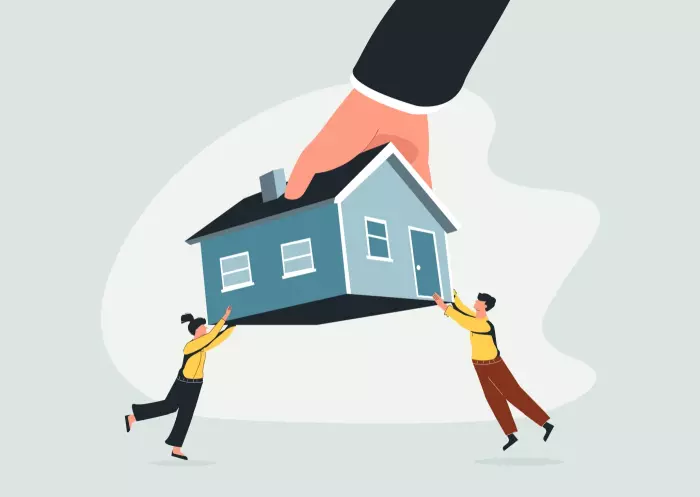BusinessDesk investments editor Frances Cook responds to emails from readers each week to answer questions about money. Below, you will find her expert advice. Send your own questions to [email protected].
Tēnā koe Frances,
In a few weeks, owning our house will cost us an extra $2,000 per month.
Overnight, we will be going from living comfortably in our Birkdale home of two years to clinging onto it by a thread – if at all.
Our interest rate with ASB will catapult from 3.2% to 7.2%. As things currently stand, we won't be able to afford the repayments such an increase will bring.
This is despite my wife and I living within our means and enjoying two healthy pay rises last year through job changes.
But the numbers simply don't add up. With our non-negotiable outgoings (childcare for our two boys, insurance in all its forms, fuel, Hop card and utilities) we fall well short of being able to repay what ASB and other banks are offering.
As things stand, our best bet is to top up our home loan debt with our two credit cards and family car loan – but do so through a second-tier lender offering an eye-watering 8.09% rate for an interest-only plan for two years. The principal price of the house won't be paid down a cent.
If we can magically find a spare $2,000 every month, we can continue as is, just much worse off. But at least we'll still have a roof over our heads. We think we have a plan in mind which includes some extremely drastic life decisions. But this is uncharted territory for us, and those decisions themselves could be fraught or naive. We don't know.
My wife and I would be really grateful to hear your whakaaro about our circumstances – at the very least to help not only us but the doubtless thousands of New Zealanders out there who will be navigating this very same gauntlet of emotional and financial distress and anxiety.
Ngā mihi ana ki a koe,
R
Hi R,
I think there will be a lot of people in this same, very stressful boat with you.
About half of New Zealand mortgages are up for renewal this year, and they will face much bigger mortgage costs when they make that change.
It’s easy to point fingers and say people should have expected interest rates to increase, but actually, the current situation is unusual. Yes, interest rates were historically low, but the fact that they’ve gone up this high in such a short amount of time, that’s not normal. A lot of people have been caught out by this, and fair enough.
So, what can you do about it?
I think we want to pull every lever we can to avoid you having to sell your home.
Obviously, a mortgagee sale where the bank sells your home from under you is the worst-case scenario. But having to sell it yourself is also really not great. We want to avoid that.
I’m hopeful that we can avoid it, even if it means taking some very bitter medicine for a while.
There’s a chance you won’t have to take this bitter medicine for too long. I don’t have a crystal ball, and I don’t know the future more than anyone else – we’ve all seen how a pandemic or a war in Ukraine can come out of nowhere and change the game.
But on the information we have currently, these high-interest rates might end up going down again soon-ish.
The Reserve Bank of NZ (RBNZ) is predicting a recession from about June. If that does happen, it would likely lower interest rates again, to try to stimulate the economy.
So, while again pointing out that it’s far from a sure thing, we might just have to keep you limping through for six months to a year.
We don’t want to make plans that rely on that, because things can change, but keeping that in mind might give you the mental fortitude to make some unpleasant cutbacks, knowing that it’s not forever.
Cutting back
There are two main levers we pull in this situation. Spending less, and earning more.
With that in mind, I think it is probably time to make as many unpleasant cuts to your budget as you can.
Get a bottle of wine or some other treat of choice. Then sit down with your wife once the kids are in bed, and go over your accounts.
Every single thing counts. If you can’t eliminate it, can you do a cheaper version of it?
Can you carpool where you once drove solo? Have you checked your electricity price on powerswitch.org.nz, to see if there’s a cheaper plan you can use? Can you eat less meat? Which subscriptions can you cut?
This is the money equivalent of a crash diet, and it’s not going to be fun. But it sounds like it’s necessary to keep you housed.
In the long term, it will be worth it.
In order to keep you sane, I’d like you to also think of a couple of things that you enjoy, that are either free or quite low cost. Keep those.
You will go insane if you don’t allow yourself a small amount of breathing room.
Earning more
Now, the second lever. Earning.
You mention that both you and your wife have had a pay rise recently. Great work, that’s always a good thing.
In this situation though, it’s worth considering if there’s anything else you can do to increase your earning power, even if it’s temporary.
We don’t want you to burn out, especially when you have young kids, but a sprint effort of earning more for a few months might be key here.
If it’s been about a year since signing on to the new job, it’s worth asking for a meeting with the boss to discuss performance, and whether you could negotiate a higher pay rate.
If you’ve been in the job less than a year, it’s still worth asking for a meeting with the boss, in my view. You could either talk to them about your situation, and whether you could qualify for a raise, or you could talk to them about whether there’s any opportunity to pick up extra hours or responsibilities in order to earn more.
I think starting with your current work is always the best place because that leaves the lowest risk of you overloading yourself and burning out.
However, if you don’t want to do that, or the answer is a no, there’s also the possibility of picking up more work on the side.
Anything you can do to freelance or contract could mean you find higher-paid work. A higher hourly rate is of course a good thing because then you won't be pushed to find as many extra hours overall.
Be strategic about your options and look for the highest earning opportunities, because that's again how we protect you from burning out.
You could also look for part-time, flexible or remote jobs that you could do in the evenings, or pick up something like tutoring work.
As I say, this isn’t something you’d want to do forever. But if both you and your wife pick up some extra hours for a few months, that might get you through.
Extra options
You could also consider something like renting out a spare room if you have one, downsizing to one car if possible, selling things that you don’t use anymore, or renting the back garden to someone with a tiny home.
None of these may be an option, or only one or two might be, I don't know your life. But use these as a starting point to think about if there are any other options for bringing in extra cash.
If you eliminate some spending, find cheaper options for others, and get a little extra money coming through the door, I think those changes will snowball up to be quite powerful.
I don’t think the next few months will be easy, but I do think making this effort will be worth it. Keeping your home is an important part of financial stability.
As a side note, money stress can wreak havoc on our relationships. Try to be kind to each other, and remember that you’re a team working together to solve the money problem, rather than treating each other as the problem.
I also talked to a mortgage expert about your situation, to see if there was any financial trickery you could try. Here’s what they had to say.
Bruce Patten, Loan Market:
This is a very difficult situation for them and many other homeowners, especially those who purchased within the last couple of years and never experienced interest rates such as this. Many of their parents will remember when interest rates for a mortgage were over 20% in the past.
There are a couple of things to bear in mind here. Based on what they are saying, their lending is over 80%.
This adds a complication to their situation because they don't have a lot of equity to play with and is also reflected in the interest rate they are quoting at 7.20% when most rates are still in the 6s. The reason for this is they will have a low equity margin added to their rate.
If you have equity greater than 20% there are options to switch to interest only, or push the loan term out, however, in this case, neither of those options are available as I would say they have only been in the house a short time. Hence the reason for considering a non-bank lender at a higher interest rate in order to go onto interest only for 2 years.
They might be better to consolidate their credit card debt and family car loan into a personal loan. Even though the rate for an unsecured loan will be around 15-17% it will only be on personal lending. This is assuming that the total amount isn't too big.
Depending on their families' situation they might be prepared to assist by putting those repayments on hold.
Unfortunately, the market is in an upward cycle at the present time, and it's a matter of seeing how you can get through the next 12–24 months. Sadly some people won't and will need to sell up or downsize.
They mentioned 'We think we have a plan in mind which includes some extremely drastic life decisions' which is what some people will have to do:
- Sell and downsize.
- Like many, move to another part of the country where houses are less expensive.
- Reduce their cost of living, cut back on non-essentials, grow your own vegetables.
- Do or redo your budget – 90% of people don't have a budget and unless you have one, how do you know what you can afford?
- Sell anything they don't need or use any more to raise some cash.
- Rent a spare room if they have one or convert a living space to another room.
- Rent their house and move in with family.
Obviously, everyone's circumstances are different and some things just aren't possible, but all I can say is that if you are able to retain the property for the next couple of years, you will make it through and be better off for it.
Send questions to [email protected] if you want to be featured in the column. Emails should be about 200 words, and we won't publish your name. Unfortunately, Frances is not able to respond to every email received, or offer individual financial advice.
Information in this column is general in nature and should not be taken as individual financial advice. Frances Cook and BusinessDesk are not responsible for any loss a reader may suffer.















